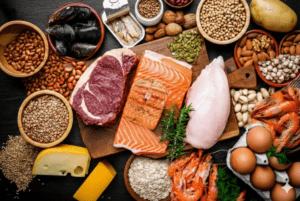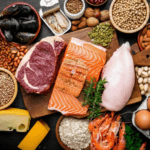Most people have heard the phrase “Eat the Rainbow” and there is a reason for this. Brightly coloured fruits and vegetables contain biologically active compounds called flavonoids and polyphenols which have antioxidant properties that have been shown to help protect against a number of diseases.
Eating plenty of fruits, vegetables, herbs and spices (aim for 10 servings per day) has been shown to boost immunity. There are different compounds in each food, that is why a varied selection is most important to give you a broad spectrum of protection.
Vitamin D:
Maintaining healthy vitamin D levels are vital for supporting the body’s natural ability to fight infection. The main source of vitamin D is not from food but sunshine. In Ireland it is recommended that we all supplement with vitamin D3 during the months of October through April based on our latitudinal position as the suns rays are not strong enough to allow the conversion of vitamin D3 in the body.
During the summer months, for adequate vitamin D3 without supplementation, 10 to 30 minutes is required of sun exposure on your face, hands and arms without any sun factor. Vitamin D has been found to play a significant role in the function of the immune system, in both innate (think your older evolutionary defence strategy) and adaptive immunity (think of your body’s strategy for defeating new specific pathogens or baddies!).
A 2017 study published in the British Medical Journal found vitamin D to be effective for preventing colds and flu. Many immune cells express vitamin D receptors and enhance the antimicrobial properties of immune cells.These antimicrobial properties act as first line of defence against foreign invaders. They are often also known as natural antibiotics as they are so effective (Reference: Source 1).
It is recommended to supplement with 50-100 mcg (2,000-4,000IU) of vitamin D daily with food during the winter months.
Vitamin A:
Several immune system functions rely on vitamin A and deficiency is known to impair the innate immune system (the non-specific ‘first line of defence’ part of the immune system). It is useful to fight infections, particularly with regard to respiratory infections. It also helps the body mop up damaging free radicals in the body.
Vitamin A is found in the diet in two forms: beta-carotene, which can be found in foods such as sweet potatoes, carrots, dark leafy greens, red and yellow peppers and fat soluble retinol which is found in foods such as eggs, butter, liver and full fat dairy products.
Beta-carotene must first be converted in the body before it can be used, which is why retinol is often referred to as ‘active vitamin A’.
Vitamin C:
Vitamin C is a powerful antioxidant which has anti-inflammatory activity. It supports the body’s ability to fight infection and has been shown to shorten the duration of a cold, and may even prevent it in some conditions.
Research is currently being undertaken to study the clinical efficacy and safety of vitamin C for the clinical management of severe acute respiratory infection (SARI) (the severe pneumonia which has been caused by the new coronavirus strain) through randomised controlled trials during this current outbreak (Reference: Source 2).
Foods rich in vitamin C include citrus fruits, kiwi fruit, berries, broccoli, kale, tomatoes and peppers. If you notice yourself catching the cold or even the flu (influenza), it is best to begin taking higher doses of vitamin C within 24 hours of the first symptoms. Take 1,000 mg every hour for the first 6 hours, then 1000 mg 3 times daily.
Zinc:
Zinc supports the function and proliferation of various immune cells. A deficiency in zinc can have a negative impact on the immune system’s ability to deal with infection.
The body is unable to store zinc so it’s very important that your daily diet supplies plenty of this immune boosting mineral. High levels of zinc are found in pumpkin seeds, sesame seeds, meat, chickpeas and lentils.
During periods of illness you can also take extra zinc in supplement form to support your immune function. It can reduce the frequency of infections as well as the duration and severity of the common cold when taken within 24 hours of onset.
Quercetin:
Quercetin is a flavonoid found naturally in plant food. It is known for its antioxidant activity and its unique structural properties mean they have the potential to interact with different cell types and be beneficial in the protection against disease.
It does this by stimulating the immune system by anti-viral activity, inhibition of histamine release, decrease in pro-inflammatory cytokines and leukotrienes. It can also improve Th1/Th2 (immune system helper cells) balance with its immunomodulating properties (Reference: Source 3).
Foods rich in quercetin include apples, yellow and green peppers, read and white onions, cherries, tomatoes, broccoli, berries and green tea. Quercetin can also be taken in supplement form.
Garlic:
Garlic contains a compound called allicin. It is a natural antibiotic and antimicrobial agent that kills viruses directly and strengthens immunity based on multiple studies.
The different compounds in garlic have an array of health benefits such as those for cardiovascular disease, may reduce viral upper respiratory infection severity, anti-tumour as well as beneficial to blood glucose concentration (Reference: Source 4).
To utilise the benefits of allicin, garlic must be manually crushed and left for minimum of 10 minutes to activate its benefits before cooking.
Turmeric:
Curcumin, the active compound found in turmeric, has anti-inflammatory properties that can help treat chronic pain and infections along with being antibacterial, antiviral and anti-fungal.
It increases the immunomodulating capacity on the body that can modulate the activation of T cells, B cells, macrophges, neutrophils, natural killer cells and dendritic cells (Reference: Source 5).
This amazing spice can be added to stir fries or meat and fish when cooking, use 1 teaspoon and some black pepper to make it more bio available.
Elderberry Extract:
Extracts of elderberry have anti-viral activity. Studies have found elderberry extracts to be beneficial for reducing symptoms of influenza and the common cold. Elderberry is a rich source of compounds called anthocyanins which give it its anti-viral activity.
Elderberry can be helpful in reducing cold duration and severity. With regard to flu, it has been shown to help prevent infection with influenza viruses as well as demonstrating potent antiviral properties that can aid in reducing flu duration and symptoms.
N-Acetyl Cysteine:
N-Acetyl Cysteine is beneficial to support the immune system and in particular for the elderly. N-Acetyl Cysteine is used in supplement form to supply the body with cysteine, an amino acid needed to support the body’s production of glutathione – a master antioxidant.
In a 6-month placebo-controlled clinical study, 262 mainly elderly subjects received either 600mg NAC twice daily or placebo. Those receiving NAC experienced significantly fewer influenza-like episodes and days in bed.
The researchers also noted that even though the rate of viral infection was the same in both groups, only 25% of the group taking NAC developed symptoms compared to 79% in the placebo group.
NAC may be particularly useful in the elderly due to the fact that plasma cysteine and glutathione levels tend to decline with increasing age (Reference: Source 6).
Selenium:
Selenium is a micronutrient with powerful antioxidant properties to fight infections. Micronutrient deficiency suppresses immunity and increases susceptibility to infections as it seems to speed up the rate that viruses can mutate.
Selenium helps to protect against bacteria, viruses, and cancer cells. For general immune health it appears to be important that optimal selenium levels are achieved.
Selenium can be found in foods, with the richest source being Brazil nuts. Oats, sunflower seeds, fish, turkey and chicken are also good sources. Eating 1 brazil nut a day can provide the RDA of selenium for an adult (Reference: Source 7).
Beta Glucans:
Beta glucans are naturally occurring polysaccharides found in bacteria and fungi, used to make cell walls and store energy. Beta glucans prevent viruses impregnating the cells by putting a shield around the cell wall.
Mushrooms are a good source of beta Glucans. They increase host immune defence by enhancing macrophages and natural killer cell function (Reference: Source 8).
Probiotics:
Having a diverse gut microbiome is an important part of immune health. It has been shown that taking probiotics increases in systemic immune response and regulation (Reference: Source 9).
Studies have also shown that probiotic use can decrease the number of respiratory infections, particularly in children.
Honey:
Honey, preferably raw, (local is best) has antioxidant properties, along with antimicrobial effects. It is a good demulcent which means it relieves minor pain and inflammation of mucous membranes. It is helpful for coughs and sore throats and can be added to hot tea.
Ginger:
Helps boost the bodies natural defences with its anti oxidant, anti inflammatory properties. Fresh ginger may also be effective against RSV virus, a common cause of respiratory infections (Reference: Source 10).
Ginger extract can inhibit the growth of different types of bacteria while the bioactive ingredient can help lower the risk of infections.
Thyme:
Fresh or dried is excellent at boosting the immune system and respiratory system. It has immunomodulatory effects, it also has antimicrobial, anti oxidant, anticarcinogenesis, anti inflammatory and antispasmodic activities.
It contains flavonoids which increase its antioxidant capacity and other health benefits. It has been used for many years in natural medicine to naturally treat coughs, bronchitis and other respiratory conditions.
Shiitake Mushrooms:
Are full of B vitamins, contain all essential amino acids and have powerful chemical properties which have many health benefits. They have immune boosting properties helping to fend off disease or illness.
Shiitake mushrooms have shown improvement in gut immunity, reduction in inflammation, support in cardiovascular health and anti cancer effects (Reference: Source 11). They are antiviral, anti fungal, and anti bacterial.
Onions:
Onions are packed with immune boosting nutrients like selenium, zinc and vitamin c along with quercetin which as already mentioned has anti viral properties.
Lifestyle
Stress reduction:
Chronic stress can negatively alter your immune system responses, making you more likely to get sick. Meditation and exercise can greatly help reduce stress.
Sleep:
Sleep greatly impacts your immune function, so it is very important to get adequate sleep. Nutrition can greatly affect the quality of your sleep.
Ensure you are eating a nutrient dense low glycemic diet. Practice good sleep hygiene and maintain consistent sleep hours— turn off screens 1 hour before bed, ensure the room is cool, quiet, and dark to optimise sleep.
Exercise:
Regular physical activity helps to boost your immune system by raising levels of infection-fighting white blood cells and antibodies, increases circulation, and decreases stress hormones.
Hydration:
Drinking adequate healthy hydrating fluids such as distilled water and herbal tea helps to loosen mucus in your upper respiratory system which means you can clear them easier from your system.
DISCLAIMER:
This information is not designed to diagnose, treat, prevent or cure any condition or illness and is for information purposes only. Please discuss any information in this article with your healthcare professional before making any changes to your current lifestyle.
REFERENCES:
1.Martineau AR, Joliffe DA et al. Vitamin D supplementation to prevent acute respiratory tract infections: systematic review and meta-analysis of individual participant data. BMJ 2017
2.ZhiYong Peng. Vitamin C infusion for the treatment of severe 2019-nCoV Infected Pneumonia. Clinical Trials.gov February 11, 2020
3.Mlcek J, Jurikova T et al. Quercetin and Its Anti-Allergic Immune Response. May 2016
4.Leyla Bayan, Peir Hossain Koulivand and Ali Gorgi. Garlic: a review of potential therapeutic effects. Avicenna Journal of Phytomedicine. Jan-Feb 2014
5.Jagetia GC, et al. “Spicing up” of the immune system by curcumin. Journal Clinical Immune 2007
6.De FS, Grassi C, et al. Attenuation of influenza-like symptomatology and improvement of cell-mediated immunity with long-term N-acetylcysteine treatment Eur Respir J, 10 (7) (1997 July)
7.Maggini S, et al. Selected vitamins and trace elements support immune function by strengthening epithelial barriers and cellular and humoral immune responses. British Journal Nutrition 2007
8.Akramiene D,et al. Effects of beta- glucans on the immune system. Medicina (Kaunas) 2007
9.Maldonado Galeano C, et al. Beneficial Effects of Probiotic Consumption on the Immune System. Ann Nuutr Metab. 2019
10.Wang S, et al. Biological properties of 6- gingerol. a brief review. Nat Prod Commun 2014
11.Shiitake Mushrooms: 8 Scientifically Proven Benefits. https://draxe.com/nutrition/shiitake-mushroom







